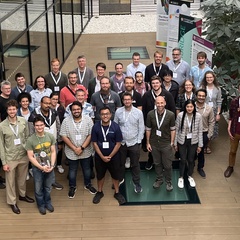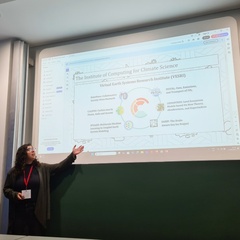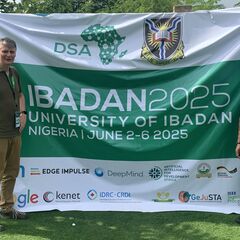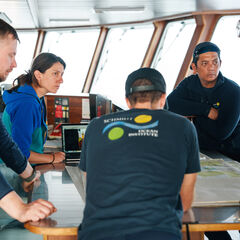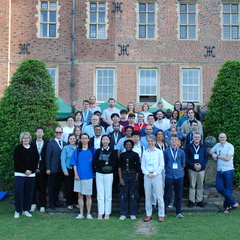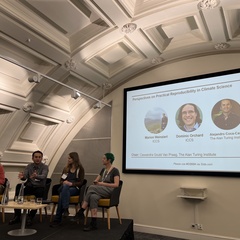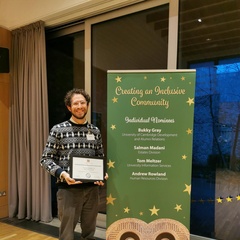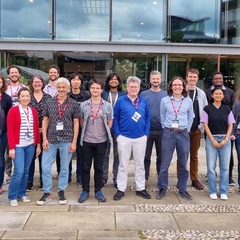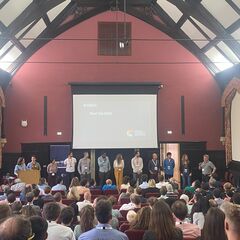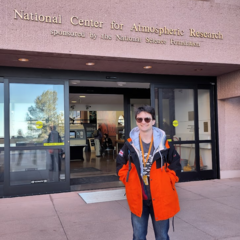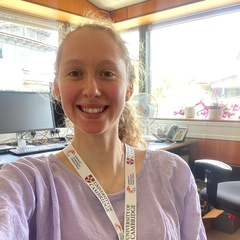28 Oct 2025
Researchers, scientists and software engineers gather for FTorch workshop
ICCS Research Software Engineers Joe Wallwork and Jack Atkinson ran a workshop in Cambridge that brought together 40 researchers, scientists and software engineers from across Europe to discuss coupling machine learning technologies into large-scale scientific models. The two-day event at the Maxwell Centre, University of Cambridge, featured eight …
27 Aug 2025
"An Electric Experience" - A Reflection on the 2025 Internship Programme
This year, several students joined the ICCS team as summer interns, with projects ranging from environmental modelling to science communication. During this eight-week programme, the interns had the chance to hone their skills in a variety of different fields and get a taste for what it’s like to do research in academia.Michael Lin, a maths undergr…
18 Aug 2025
ICCS at the European Geosciences Union
The European Geosciences Union (EGU) General Assembly is the largest geoscience conference in Europe, with nearly 21,000 participants from over 120 countries. The conference brings together geoscientists, particularly early career researchers, from all over the world to one meeting covering all disciplines of the Earth, planetary, and space science…
11 Aug 2025
Data Science Africa 2025 Summer School and Workshop
The following blog is written by Dr Adeleke Bankole. Adeleke is a research software engineer at the ICCS specialising in computational methods for fluid dynamics.In June this year, ICCS's Research Software Engineer (RSE) Dr Adeleke Bankole was invited as a speaker at the yearly Data Science Africa (DSA) Summer School and Workshop in Ibadan, Nigeria…
4 Aug 2025
Ocean currents and ice shelves – ICCS researcher's Antarctic cruise leads to new discoveries
Earlier this year, ICCS Early Career Advanced Fellow Dr Laura Cimoli set off to the Bellingshausen Sea off the coast of Antarctica to study the ocean circulation and the impacts of glacial melting in the region.As the team was conducting their survey, however, an enormous iceberg calving event caused them to rapidly change course. Iceberg A-84, app…
28 Jul 2025
The 2025 ICCS Summer School: equipping climate scientists with RSE skills
Earlier this month, the ICCS hosted its fourth annual Summer School at Newnham College, University of Cambridge. The week-long event brought together members of the Schmidt Sciences Virtual Earth System Research Institute (VESRI), other project partners, and local students for a variety of training workshops, networking opportunities, and a full-da…
14 May 2025
Reflections on the 27th EuroAD workshop
Dr Joe Wallwork, ICCS Research Software Engineer, reports back from Kaiserslautern.Derivatives are at the core of scientific computing: from the Jacobian matrices used in nonlinear solvers to the gradient vectors used in optimisation methods; from the back-propagation operator in machine learning (ML) to the Hessian matrices used in uncertainty qua…
28 Apr 2025
ICCS joins £4.25M project to predict marine ecosystem tipping points
The Institute of Computing for Climate Science (ICCS) is proud to collaborate on TiMBER — a bold, multi-institutional research effort to forecast tipping points in marine ecosystems and help the UK prepare for their consequences and opportunities, especially in the fishing and aquaculture industries.Funded by the UK Government’s Advanced Research +…
18 Dec 2024
Artifact Evaluation at this year's Climate Informatics 2024
This blog post was co-authored by ICCS members Dominic Orchard, Marion Weinzierl and Roly Perera, and also Alejandro Coca-Castro from The Alan Turing Institute.CapsuleIn 2024, the Climate Informatics conference embarked, for the first time, on adding an Artifact Evaluation (AE) process following the standard peer review process. This provided an op…
17 Dec 2024
University of Cambridge Professional Services Recognition Awards 2024
The Professional Services Recognition Awards take place every year in December. The awards recognise and celebrate outstanding contributions across all professional service areas in the University. On 5 December the awards ceremony commenced with a warm welcome from the University’s Vice-Chancellor, Deborah Prentice, at the Storey's Field Centre, w…
17 Jul 2024
The 2024 ICCS Summer School - sharing research software engineering skills for climate science
After the very successful Cross-VESRI convening, the ICCS quickly turned their attention to the Summer School in the second half of last week. Whilst it did make for an intense week, having the two events back-to-back allowed for a large international attendance from Virtual Earth System Research Institute project scientists.This was the Institute …
17 Jul 2024
The 2024 Cross-VESRI Convening: Collaboration and Education across VESRI projects
Last week the Institute of Computing for Climate Science hosted the Cross-VESRI convening in conjunction with Schmidt Sciences, the funder of the Virtual Earth System Research Institute (VESRI) and the ICCS.Read about our collaborators and the VESRI project teams and find out more about Schmidt Sciences. The event consisted of 4 days of science ses…
26 Jun 2024
Collaboration across continents - my visit to NCAR
The following blog is written by Jack Atkinson. Jack is a senior research software engineer at the ICCS who spent two weeks in Boulder, Colorado, at NCAR, working closely with model developers in an effort to make a breakthrough in an ongoing project. The visit also gave Jack the opportunity to share his own expertise and details of ICCS projects w…
22 May 2024
ICCS co-director co-chairs the 1st ACM Workshop on Programming for the Planet
ICCS's co-director, Dominic Orchard, co-chaired thhe 1st ACM Workshop on Programming for the Planet in London. The gathering brought together researchers from computer science to discuss how to close the gap between state-of-the-art programming methods being developed in academia and the use of programming in climate analysis, modelling, forecastin…
19 Dec 2023
Communications, networks and branding at ICCS
The following blog is written by Aleksandra Higson. After an initial two-month summer internship, she continued on into December, working on a variety of multi-media communications for the Institute of Computing for Climate Science (ICCS).What a whirlwind of an experience! Interning with ICCS meant that I could have a go at everything comms-related…
